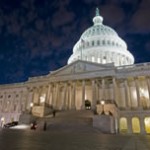
A controversial federal regulation that has proven onerous for many online colleges was struck down by a wide margin in the U.S. House of Representatives Feb. 29, although the repeal is not expected to pass the Senate.
In a largely ceremonial move, state authorization rules—which require colleges and universities with online programs to seek permission to offer their courses in all 50 states—were repealed after more than a year of complaints from Congressional Republicans and higher-education officials who said the regulations would restrict college access.
The rules, which took effect last July after months of criticism from online college administrators, were meant to ensure schools comply with state laws that require course-by-course registration with state accreditors. If a college didn’t comply, it would be denied federal funding—the lifeblood of most campuses.
The Republican-controlled House passed the repeal 303-114, with 69 Democrats voting yes. Educators said there isn’t even a slim chance the state authorization repeal will hold up in the Democrat-controlled Senate.
“It’s a largely symbolic vote, but I don’t think the symbolism is going to be completely lost,” said John Ebersole, president of Excelsior College, a New York-based online school. “The message is that we’ve had several months of trying to comply with these rules, and it is a problem. … The problems with these rules are worse than the Department of Education ever realized.”
Alan Contreras, former administrator for Oregon’s Office of Degree Authorization, said that even if the state authorization repeal passed through the Senate, “the net effect on colleges would be zero” because it would not strip state regulations already in place.
“They’ll still have to hire people to work on [complying with] state regulations,” he said. “I’m very sorry colleges are inconvenienced to have to operate under the law, but they need to clean it up.”
The House repeal would, however, remove the federal government from the regulatory equation, meaning colleges and universities could receive vital federal Title IV funds even if they did not abide by established state rules.
Contreras said state authorization regulations are needed—especially with the proliferation of online education options—because students have enrolled in programs, taken courses, and earned a degree, only to be told that the school they graduated from had not complied with state laws and therefore wasn’t authorized in that state.
“That is the kind of mess colleges are making for their students,” he said. “Schools should provide students with this information, but of course, they don’t.”
The House vote was a blow against basic consumer protections pushed by Education Secretary Arne Duncan and President Obama since 2009, said Justin Hamilton, an Education Department spokesman.
“This bill is bad for students and taxpayers and would undermine important protections against waste, fraud, and abuse of the over $200 billion in federal student aid we distribute each year,” he said.
Julie Margetta Morgan, a policy analyst for the liberal-leaning Center for American Progress (CAP), wrote in a blog post that while the state authorization rules are “not perfect,” they are necessary to protect students from online colleges that have not complied with state mandates.
“With the rapid proliferation of online education programs, a state has no way of knowing who is operating within its jurisdiction unless the college maintains a physical campus,” Margetta Morgan wrote.
If the state authorization issue is taken up by Congressional lawmakers later this year, there may be some room for compromise between the Obama administration and the large Republican House majority, said Andrew Magda, a senior analyst for Eduventures. The original federal rules would be largely dismantled in an agreement between the parties, he added.
“I think the GOP would support the authority of accreditors in these situations to ensure quality, which is an authority they already have—and the federal rules note this as well,” Magda said.
Sona Karentz Andrews, the Oregon University System’s vice chancellor for academic strategies, said the House Republican-led effort to rid colleges of the federal rules is a “good signal,” but the backlash against state authorization rules wouldn’t change the time-intensive work needed to register programs in every state.
“It’s not a game changer for us in terms of behavior,” she said, adding that the rules have discouraged some online colleges from operating in states with the most demanding regulations. “This has the biggest negative impact on students. … The end result is that state rules are not necessarily student friendly. It’s not the kind of victory that has us whooping and hollering.”
Massachusetts, Arkansas, and Minnesota were named last year as states that could see online programs leave in droves due to excessive rules.
Six in 10 colleges and universities with online programs identified states they likely would not serve if state authorization rules are fully implemented. Twenty-nine schools said they would withdraw online classes from Massachusetts, 16 said they would leave Minnesota, and 15 wouldn’t serve college students in Arkansas.
“It’ll have a chilling effect on distance education, and students will start complaining and rising up about their freedom of taking classes being curtailed in the name of consumer protections,” said Russell Poulin, deputy director of WCET.
Standing by state authorization rules even after they were soundly struck down in the House, Ebersole said, could be a political liability for the Obama administration as the president vies for re-election.
“They’re playing right into the hands of Republicans who fight against regulations and say they’re unnecessary,” Ebersole said. “We’re hoping that the Education Department will note that there is a lot of advocacy for a better approach to this.”
- Research: Social media has negative impact on academic performance - April 2, 2020
- Number 1: Social media has negative impact on academic performance - December 31, 2014
- 6 reasons campus networks must change - September 30, 2014

Comments are closed.